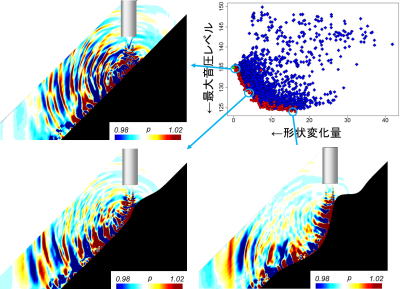文書の過去の版を表示しています。

Research
Digital Twin
Digital Twin is a new academic field that aims to replicate everything in the real world in the digital space, enabling the prediction of product failures and the optimization of production management through real-time simulation. To realize the Digital Twin, various advanced technologies are required, and in our laboratory we are working on the research and development of systems and platforms that integrate high-precision 3D measurement, real-time sensing, highly reliable high-fidelity simulation, industrial big-data analysis, and other necessary elements.

(Matsuo, Fujii, Transactions of the JSME(in Japanese), Vol.125, No.1249, 2022)
Large-Scale Fluid Analysis
We are conducting large-scale fluid analysis using advanced simulation techniques and supercomputers. Our aim is to solve issues related to fluids in the industrial domain and achieve product innovation. Our research into large-scale flow control using microfluidic devices, known as dielectric barrier discharge plasma actuators, contributes widely from fundamental research to practical applications, and we actively collaborate with companies in joint research.

We are applying Proper Orthogonal Decomposition (POD), Dynamic Mode Decomposition (DMD), and other methods to the numerical simulation results to investigate the transition mechanism of vortex breakdown patterns.
Multi-objective Design Exploration
We are researching optimization techniques for solving multi-objective optimization problems encountered in real-world design problems, and exploration techniques (data mining) for extracting useful design information from these solutions. The goal is to develop new exploration technologies that efficiently present design candidates to decision-makers and support decision-making based on multiple evaluations in design and development, where increasingly rapid results are required (process innovation).

Red dots represent the optimal solutions. The optimal direction is toward the lower-left corner. There is a trade-off relationship where improving one objective results in the deterioration of another.
Next-Generation Transportation System
We are researching the development of models and simulation techniques for designing transportation systems that balance safety and efficiency, such as aircraft and trains. Also, We analyze
航空機、列車など安全性と効率性を両立する運行システムを策定するモデルとシミュレーション手法の開発、それを利用して社会の構成要素が互いに影響し合う効果を分析・予測する技術の研究を行っています。計画に基づいて運行(運航)される大規模輸送システムは近年急速に複雑化し、これら社会を支える輸送システムにおける遅延やそれにともなう経済的な損失は近年日常的になっており社会問題となっています。ここでは現在、航空交通システムを主なターゲットにして、スーパーコンピュータも活用しながら急速に複雑化する大量輸送システムの効率化に資することを目指しています。

Results of multi-objective optimization with departure times as parameters in the flight plan.